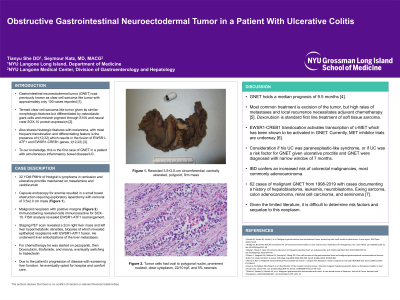Sunday Poster Session
Category: IBD
P0806 - Obstructive Gastrointestinal Neuroectodermal Tumor in a Patient With Ulcerative Colitis
Sunday, October 22, 2023
3:30 PM - 7:00 PM PT
Location: Exhibit Hall

Has Audio

Tianyu She, DO
NYU Long Island
Mineola, NY
Presenting Author(s)
Tianyu She, DO1, Seymour Katz, MD, MACG2
1NYU Long Island, Mineola, NY; 2NYU Langone, Lake Success, NY
Introduction: Malignant gastrointestinal neuroectodermal tumor (GNET), previously known as clear cell sarcoma like tumor, is an extremely rare and aggressive mesenchymal neoplasm with high rates of recurrence, metastases, and mortality. There are currently no guidelines on standard therapies. We present a case of GNET found in a 32-year-old male with a history of lymphoma and ulcerative colitis (UC) with synchronous multiple liver metastasis which to our knowledge is the first documented case in a patient with concomitant IBD.
Case Description/Methods: A 32 year-old-male with a history of Hodgkin’s lymphoma in remission was diagnosed with ulcerative proctitis in 2019 and maintained on mesalamine and vedolizumab. Capsule endoscopy in evaluation of anemia resulted in a small bowel obstruction necessitating exploratory laparotomy. A 3.5×2.0-cm mass was removed, and microscopic examination revealed malignant neoplasm with positive margins. Tumor cells had oval to polygonal nuclei, prominent nucleoli, clear cytoplasm (Figure 1). FISH analysis revealed EWSR1-ATF1 rearrangement, (+) t(12;22). PET scan revealed liver masses, biopsies of which revealed epithelioid neoplasms with EWSR1-ATF1 fusion. He underwent multiple trials of different chemotherapy agents but after 3 years, due to the patient’s rapid progression of disease with worsening liver function, he eventually opted for hospice and comfort care.
Discussion: In our patient, ulcerative proctitis and GNET were diagnosed in April and November of 2019 respectively. Given this narrow window of 7 months, there was consideration if his UC was actually a paraneoplastic-like syndrome, or if UC was a risk factor for GNET.
Inflammatory bowel disease (IBD) confers an increased risk of colorectal malignancies, most commonly adenocarcinoma. It often appears similar to and shares many histologic features with melanoma. The most frequent translocation and differentiating feature is the presence of t(12:22) which results in the fusion of EWSR1-ATF1 and EWSR1-CREB1 genes. Melanoma is a nonepithelial neuroectodermal neoplasm associated with IBD.
Biologics and immunosuppressives increase the risk of melanoma in IBD patients, however, our patient did not start vedolizumab until after the diagnosis of GNET. Additionally, there appears to be an intrinsic increased risk for melanoma in IBD that is not associated with immunosuppressive agents. Given the limited literature, it is difficult to determine risk factors and sequelae to this neoplasm.

Disclosures:
Tianyu She, DO1, Seymour Katz, MD, MACG2. P0806 - Obstructive Gastrointestinal Neuroectodermal Tumor in a Patient With Ulcerative Colitis, ACG 2023 Annual Scientific Meeting Abstracts. Vancouver, BC, Canada: American College of Gastroenterology.
1NYU Long Island, Mineola, NY; 2NYU Langone, Lake Success, NY
Introduction: Malignant gastrointestinal neuroectodermal tumor (GNET), previously known as clear cell sarcoma like tumor, is an extremely rare and aggressive mesenchymal neoplasm with high rates of recurrence, metastases, and mortality. There are currently no guidelines on standard therapies. We present a case of GNET found in a 32-year-old male with a history of lymphoma and ulcerative colitis (UC) with synchronous multiple liver metastasis which to our knowledge is the first documented case in a patient with concomitant IBD.
Case Description/Methods: A 32 year-old-male with a history of Hodgkin’s lymphoma in remission was diagnosed with ulcerative proctitis in 2019 and maintained on mesalamine and vedolizumab. Capsule endoscopy in evaluation of anemia resulted in a small bowel obstruction necessitating exploratory laparotomy. A 3.5×2.0-cm mass was removed, and microscopic examination revealed malignant neoplasm with positive margins. Tumor cells had oval to polygonal nuclei, prominent nucleoli, clear cytoplasm (Figure 1). FISH analysis revealed EWSR1-ATF1 rearrangement, (+) t(12;22). PET scan revealed liver masses, biopsies of which revealed epithelioid neoplasms with EWSR1-ATF1 fusion. He underwent multiple trials of different chemotherapy agents but after 3 years, due to the patient’s rapid progression of disease with worsening liver function, he eventually opted for hospice and comfort care.
Discussion: In our patient, ulcerative proctitis and GNET were diagnosed in April and November of 2019 respectively. Given this narrow window of 7 months, there was consideration if his UC was actually a paraneoplastic-like syndrome, or if UC was a risk factor for GNET.
Inflammatory bowel disease (IBD) confers an increased risk of colorectal malignancies, most commonly adenocarcinoma. It often appears similar to and shares many histologic features with melanoma. The most frequent translocation and differentiating feature is the presence of t(12:22) which results in the fusion of EWSR1-ATF1 and EWSR1-CREB1 genes. Melanoma is a nonepithelial neuroectodermal neoplasm associated with IBD.
Biologics and immunosuppressives increase the risk of melanoma in IBD patients, however, our patient did not start vedolizumab until after the diagnosis of GNET. Additionally, there appears to be an intrinsic increased risk for melanoma in IBD that is not associated with immunosuppressive agents. Given the limited literature, it is difficult to determine risk factors and sequelae to this neoplasm.

Figure: Figure 1. GNET tumor cells with oval to polygonal nuclei, prominent nucleoli, and clear cytoplasm
Disclosures:
Tianyu She indicated no relevant financial relationships.
Seymour Katz indicated no relevant financial relationships.
Tianyu She, DO1, Seymour Katz, MD, MACG2. P0806 - Obstructive Gastrointestinal Neuroectodermal Tumor in a Patient With Ulcerative Colitis, ACG 2023 Annual Scientific Meeting Abstracts. Vancouver, BC, Canada: American College of Gastroenterology.

